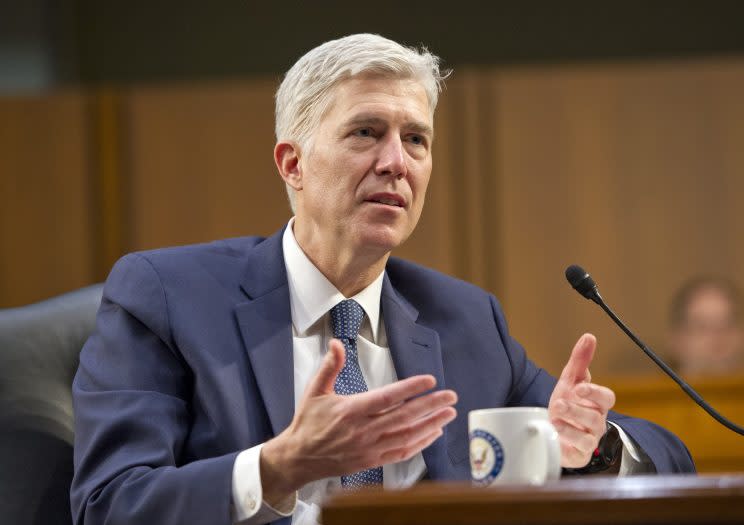Republicans nuke Supreme Court filibuster to squeeze through Gorsuch
WASHINGTON — Senate Republicans scrapped a long-standing precedent requiring 60 votes to end filibusters of Supreme Court nominees in order to push through President Trump’s Supreme Court nominee, Neil Gorsuch.
Most Democrats joined a filibuster of the nominee, arguing that he was outside of the legal mainstream and that Republicans owed them a “consensus” nominee after they blocked a hearing on former President Obama’s nominee Merrick Garland last year. The first vote to end debate on Gorsuch failed, 55 to 45 Thursday morning, with just four Democrats joining Republicans to end a filibuster.
Then, Republicans changed the 60-vote precedent on a party-line vote, 52 to 48. The Senate then voted to end debate on Gorsuch with 55 votes: three Democratic senators — Joe Donnelly, Heidi Heitkamp, and Joe Manchin, all of whom are up for reelection next year in conservative-leaning states — joined the Republicans. Now, just 51 votes are required to end a filibuster and proceed to a floor vote to confirm a Supreme Court nominee.
Senate Majority Leader Mitch McConnell was always clear that he would change the precedent of the Senate if Democrats refused to allow a vote on Gorsuch. “We need to restore the norms and traditions of the Senate and get past this unprecedented partisan filibuster,” McConnell said on the floor, before starting the process.
Senate Democrats may still take 30 hours of debate before the final vote, which is now expected to take place on Friday evening.
The battle over changing the rules has caused much handwringing in the Senate, which prides itself on being more deliberative and bipartisan than the rowdier House. Some Senate Republicans, such as Bob Corker of Tennessee, have argued this was a step that could “destroy” the Senate, and possibly lead the body to also change its rules and only require 51 votes to end debate on legislation. That would mean a majority party could quickly push through bills, instead of requiring some buy-in from the other side.

But McConnell said Tuesday that not a single member of his caucus would vote to change the legislative filibuster, since it “makes the Senate the Senate.” Republicans blame Democrats because they eliminated the filibuster for lower-court judges in 2013 and because they blocked Gorsuch. The Colorado jurist’s backers note that he attracted some support from liberal lawyers and is widely viewed as qualified for the job. “The majority of my Democratic counterparts simply disagree with the notion that the filibuster should only be used in the nomination process under extraordinary circumstances,” said Sen. Susan Collins, R-Maine.

Senate Minority Leader Chuck Schumer said in a floor speech before the cloture vote that he believed the blame should be apportioned more on Republicans than Democrats. “We believe that what the Republicans did to Merrick Garland was worse than a filibuster, declaring mere hours after Justice Scalia’s death that they would deny the constitutional prerogative of a president with 11 months of his term left,” Schumer said.
“In a post-nuclear world, if the Senate and the presidency are in the hands of the same party, there’s no incentive to even speak to the Senate minority,” Schumer said. “That’s a recipe for more conflict and bad blood between the parties, not less.”
West Virginia Sen. Joe Manchin is one of a handful of Democrats who voted to end a filibuster on Gorsuch, criticized the “hypocrisy” of both sides in a statement right before the vote — saying both parties are sticking to “talking points” instead of trying to fix the situation.
“This is precisely what is wrong with Washington, and if it happens, both Democrats and Republicans will bear the shame,” Manchin said.
Read more from Yahoo News:


